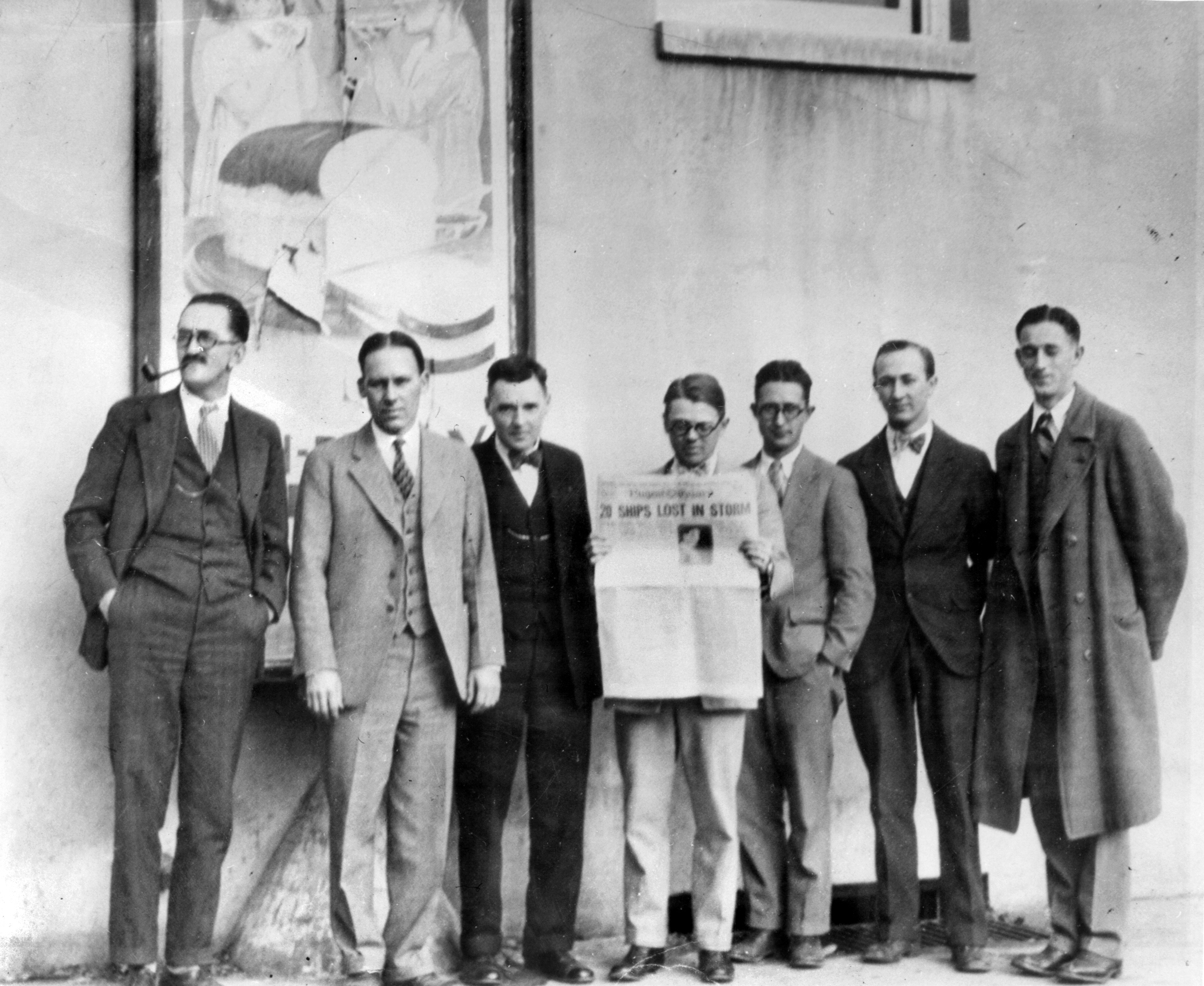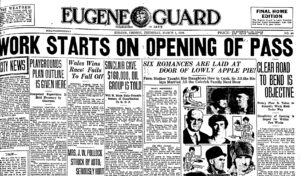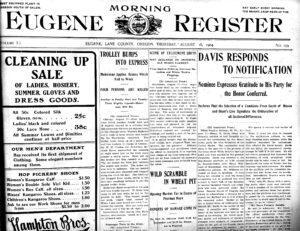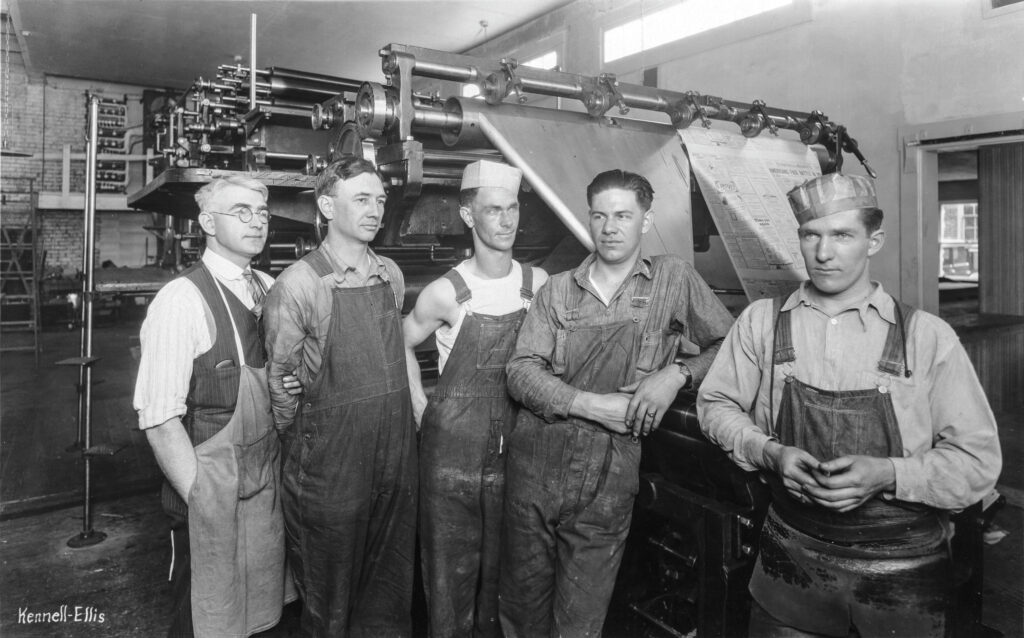Guard publisher buys the competing paper

1927-1937
By Mark Baker
For The Register-Guard
Thirty-three-year-old Alton Baker paid just under $100,000 for the Eugene Guard, the equivalent of about $1.3 million in 2017 dollars. As Register-Guard columnist Bob Welch wrote in 2002 for a story about the 75th anniversary of Baker family ownership of the newspaper, it was “roughly the amount of money New York Yankees’ slugger Babe Ruth was demanding per year on the same day the Guard purchase was finalized.”
In a front-page story that ran March 1, 1927, just a few days after stepping off the train from Cleveland with his wife and four young children, Baker said: “I have come to Eugene because I believe it to be one of the coming important cities in the Pacific Northwest. And I have bought the Guard because I believe it to be a first-class newspaper property, with a great future.”

After graduating from Cornell University in 1916 and serving in the U.S. Army Air Corps and as an ambulance driver in France during World War I, Baker had six years of experience on both the news and advertising sides of the Plain Dealer newspaper in Cleveland, where his father, Elbert Baker Sr., had been the longtime general manager and was now president of the company.
Alton Baker would apply many of the principles that his father espoused in Cleveland in shaping and improving the Eugene Guard. Elbert Baker had insisted at the Plain Dealer on accurate reporting of circulation figures to advertisers, an unusual tactic in those days, according to Warren Price’s book. And he insisted on separating news from opinion, “which few newspapers beyond The New York Times were doing,” Price wrote.
Soon after arriving in Eugene, Alton Baker made his first key hire.
Bill Tugman, a Harvard graduate, had made a name for himself as the Plain Dealer’s hard-charging police reporter. With a Clark Gable mustache and a pipe perpetually in his mouth, the outspoken Tugman was the same age as Baker, 33, but the polar opposite of Baker’s shy and reserved manner.
During his days in Eugene as managing editor, and then editor, of the newspaper, Tugman wrote strong-minded editorials, quarreled with the City Council on a regular basis – in person – directed plays at Very Little Theatre, and made a flummoxed foe out of Wayne Morse, Oregon’s legendary U.S. senator.
“If you haven’t got enemies,” Tugman once said, “you don’t deserve any friends.”
It was Tugman who, in 1929, penned the all-caps “CITIZEN OF ITS COMMUNITY” credo that still appears on the paper’s editorial masthead.

Eugene was still a two-newspaper town in 1929. However, in order to compete with the rising Guard, the Morning Register switched to afternoon publication in 1930.
One day, a representative of the Register appeared in Baker’s office and wanted to know if he was interested in selling the Guard.
“My father, in his blunt way, told the emissary he hadn’t come all the way from Cleveland to sell a newspaper,” the late Alton “Bunky” Baker Jr., The Register-Guard’s editor and publisher from 1961 to 1982, said in 2002. “He was here to stay.”
The next day, as the story goes, the rep returned with an offer of a different sort: Was Baker interested in buying the Register?
Indeed, he was, as risky as that proposition was at the time.
The Register’s asking price, $244,000 (about $3.5 million in 2017 dollars), was steep. The deal went through, though, and on Nov. 18, 1930, the Eugene Register-Guard was born.
“The fact that Baker carried this load of the combined Register-Guard, with its heavy debt, through the Depression is sufficient evidence that he had talents equal to his father’s,” Price wrote.
“Enemies of The Register-Guard in Eugene have intimated on occasion that (the newspaper) made its way only because of Elbert Baker and the Cleveland Plain Dealer,” Price wrote, referring to Elbert Baker’s initial stock in the Guard. “This is disproved, however, by records showing how, year by year, Alton Baker whittled down his loan.”
Alton Baker Sr. also lowered his own salary several times between 1931 and 1933, from $150 a week to $85.50 a week. And he cut employee salaries, twice, by 10 percent to keep the paper afloat.
After all, there was journalism to be done; crusades to be waged.
And no crusade was more crucial, in the eyes of Baker and Tugman, than the one in 1932 to save the University of Oregon from being moved to Corvallis and consolidated with what was then Oregon State College, a move that also would have merged the law schools at the UO and Willamette University in Salem.
“We told them to go to hell,” Tugman said years later, in telling the story of how a delegation from Corvallis came to Eugene to convince the power block that the UO should merge with OSC.
The merger proposal was known as the Zorn-MacPherson Bill, an initiative sponsored by Henry Zorn of Aurora, president of the Marion County Tax Equalization League, and state Rep. Hector MacPherson of Linn County, a former OSC economics professor.
The motive was money – ostensibly the lack thereof – during the early years of the Depression. Consolidation was needed to cut higher education expenses, the bill’s sponsors argued.
The initiative began in the spring of 1932 and culminated with the bill’s sound defeat at the polls by state voters, by a 6 to 1 ratio, in November.
The only Oregon county to vote in favor of the bill was Benton County (5,629 to 1,576), while Lane County residents voted 37 to 1 (23,653 to 638) against. The state vote was 292,486 opposed, and 47,275 in favor.
“In Eugene, we are, of course, elated by the result,” Tugman wrote. “This struggle has cost us much. Yet the struggle has been worthwhile, if only because it has awakened in the state a new appreciation of the University and the whole great system of higher education.”

Mark Baker, who researched and wrote the stories for this special section, is a former Register-Guard reporter and a member of the third generation of the Baker family.

Mark Baker has been a journalist for the past 25 years. He’s currently the sports editor at The Jackson Hole News & Guide in Jackson, Wyo.
